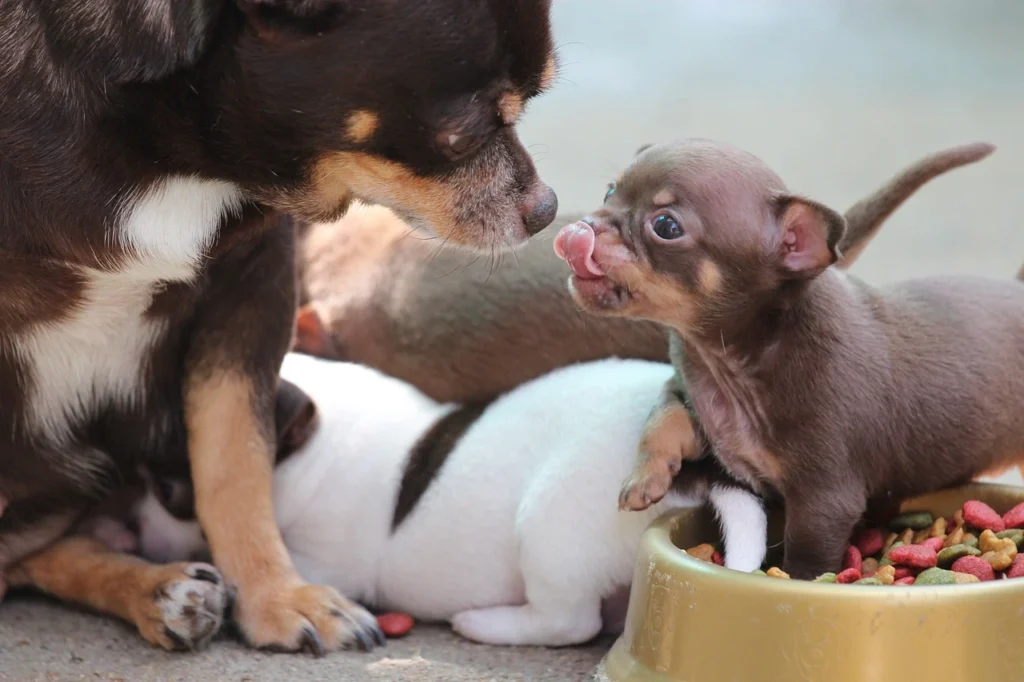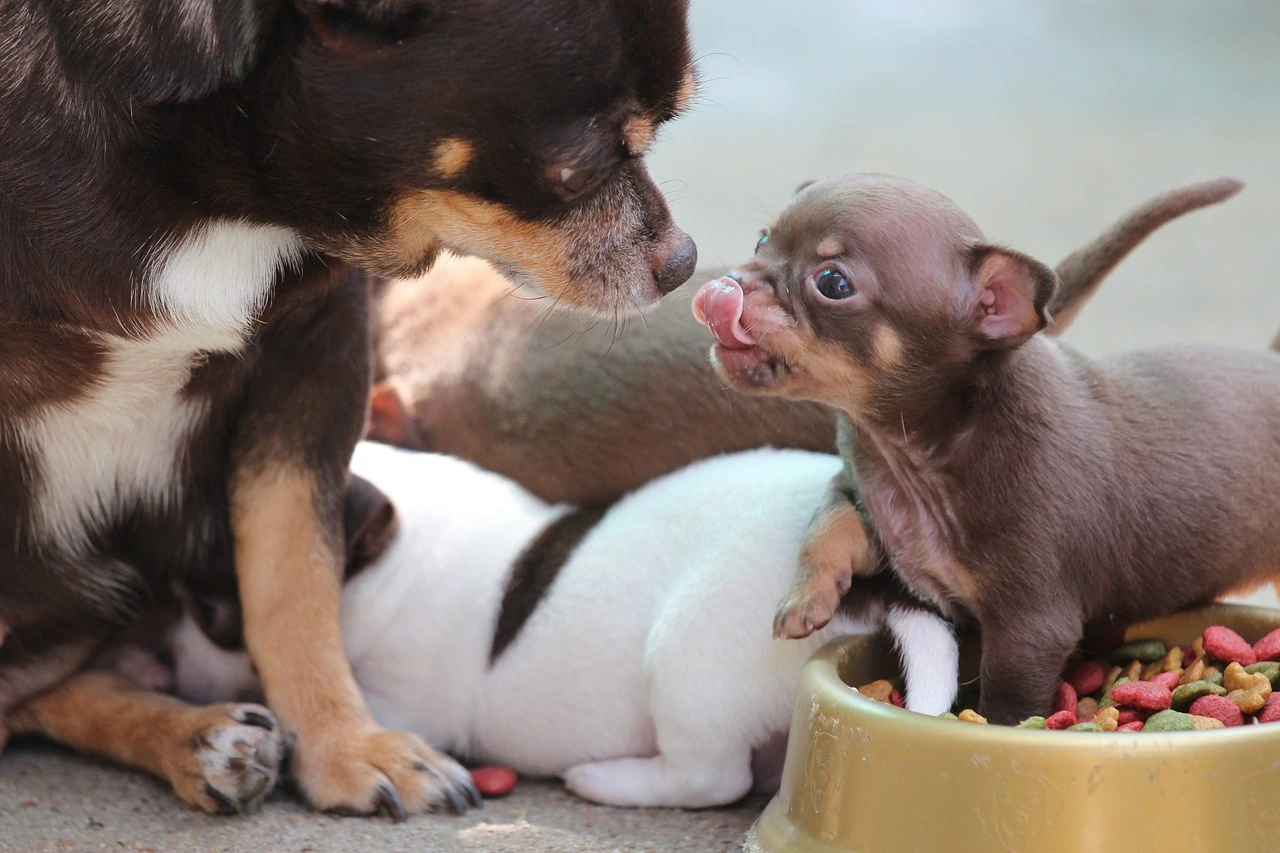Have you ever held a tiny Chihuahua and felt their enormous heart beating inside such a small body? Breeding Chihuahua dogs is more than just creating adorable puppies. It’s about keeping alive a breed with a rich history from ancient Mexico.
When you start breeding Chihuahua dogs, you’re not just raising puppies. You’re becoming a guardian of a unique and spirited breed. It takes passion, knowledge, and commitment to understand the needs of chihuahua puppy breeding.
Chihuahuas are more than pets; they connect us to a proud lineage that spans generations. With their tiny frames measuring just five to eight inches tall and weighing no more than six pounds, these miniature companions have big personalities.
Key Takeaways
- Breeding Chihuahuas requires deep understanding of the breed’s unique characteristics
- Careful health screening is crucial before starting breeding process
- Chihuahuas have specific genetic considerations
- Proper socialization and care are essential for healthy puppies
- Ethical breeding practices protect the breed’s long-term health
Understanding the Chihuahua Breed
Explore the world of Chihuahuas, a breed that wins hearts with its small size and big personality. These tiny friends have a rich history and unique traits that make them special in the dog world.
History and Origin
The history of Chihuahuas goes back to ancient Mexico, with deep roots in pre-Columbian cultures. Descended from the Techichi dog, they have a long genetic history. Archaeological finds show they were important in Aztec and Toltec societies.
“Around 70% of the Chihuahua’s DNA is believed to have originated from the Techichi,” according to a study by the Institute of Technology in Stockholm.
Breed Characteristics
Chihuahuas are known for their unique features. These dogs have:
- Apple-dome shaped heads
- Large, expressive eyes
- Erect, pointed ears
- Bold and affectionate personality
Size and Weight
Chihuahuas are small but pack a big punch. Their tiny size hides a big personality.
| Characteristic | Measurement |
|---|---|
| Height | 5-8 inches |
| Weight | 3-6 pounds |
| Lifespan | 14-16 years |
Chihuahuas have two coat types: smooth and long-haired. They come in many colors like tan, chocolate, white, black, and tricolor. Despite their small size, they are strong companions that fit well in many homes.
Reasons to Breed Chihuahuas
Breeding Chihuahuas is more than just making pets. It’s a journey filled with challenges and rewards. To be a responsible breeder, you need passion, dedication, and a deep love for the breed.
Personal Satisfaction
Chihuahua breeding brings deep personal joy. You get to watch puppies grow and develop. It’s a chance to connect with a breed steeped in Mexican culture.
- Witness the miracle of puppy birth
- Create strong genetic lines
- Develop deep connections with puppies
- Share your passion with other dog enthusiasts
Financial Opportunities
While not the main reason, breeding Chihuahuas can also be financially rewarding. Purebred Chihuahuas with good lineage can earn money for dedicated breeders.
| Breeding Potential | Estimated Value |
|---|---|
| Quality Purebred Puppy | $500 – $2,500 |
| Champion Lineage Puppy | $2,500 – $5,000 |
Preserve the Breed
Breeding Chihuahuas helps keep the breed pure. Chihuahua breeding tips stress the need to keep genetic diversity and promote healthy bloodlines. By choosing the right breeding pairs, you help the breed thrive and improve.
“Breeding is not just about producing puppies, but about improving the breed with each generation.” – Professional Chihuahua Breeder
Remember, responsible breeding needs a lot of knowledge, commitment, and love for Chihuahuas. Your aim should be to raise healthy, well-socialized puppies that showcase the breed’s best qualities.
Preparing for Breeding Chihuahuas
Breeding Chihuahuas needs careful planning and dedication. Knowing the key chihuahua breeding requirements is vital for responsible breeding. Your success depends on thorough preparation and smart decisions.
Choosing the Right Pair
Choosing the right breeding pair is crucial. You need to consider several factors:
- Evaluate genetic health and temperament
- Confirm breed standard compliance
- Assess physical characteristics
- Check compatibility between dogs
Health Testing Prior to Breeding
Before breeding, comprehensive health testing is essential. Your vet can help with important screenings:
| Test Type | Purpose |
|---|---|
| Genetic Screening | Identify potential inherited disorders |
| Brucellosis Test | Ensure reproductive health |
| Physical Examination | Confirm overall dog wellness |
Creating a Suitable Breeding Environment
Your breeding environment is key for success. Focus on these important aspects:
- Create a quiet, calm space for mating
- Provide proper nutrition
- Implement parasite prevention
- Maintain consistent temperature
“Successful breeding starts with meticulous preparation and understanding of your dogs’ specific needs.” – Veterinary Breeding Expert
Remember, responsible breeding demands dedication, knowledge, and a commitment to your Chihuahuas’ health and well-being.
The Breeding Process
Breeding Chihuahuas needs careful planning and knowing their unique cycle. The process involves many details for healthy puppies and keeping the breed true.

Understanding the Chihuahua Heat Cycle
The heat cycle of Chihuahuas is key for breeding success. Female Chihuahuas have cycles lasting 18 to 21 days. Each stage is important for breeders to watch:
- Proestrus: Initial stage lasting around 9 days
- Estrus: Fertile period lasting 3 to 11 days
- Diestrus: Post-mating phase
- Anestrus: Resting period between cycles
Optimal Mating Techniques
Successful mating needs the right timing and preparation. Experts suggest:
- Wait until the female is at least two years old
- Breed only once a year for health
- Watch the female’s fertile window
| Breeding Consideration | Recommended Guidelines |
|---|---|
| Female Breeding Age | 2-7 years old |
| Breeding Frequency | Once per year |
| Typical Litter Size | 2-3 puppies |
Health Monitoring During Mating
Health monitoring is vital during breeding. This includes vet checks, genetic tests, and watching the health of both dogs.
“Responsible breeding is about quality, not quantity” – Chihuahua Breed Experts
Remember, breeding Chihuahuas is more than just making puppies. It takes dedication, knowledge, and a focus on health and genetic variety.
Caring for the Dam
Pregnant Chihuahua care needs special attention and knowledge. Your small breed needs extra support during this time. This ensures a healthy pregnancy and successful delivery.
Chihuahua pregnancy nutrition is key for health. Knowing your pregnant dam’s unique needs is crucial. It greatly affects her well-being.
Nutritional Requirements
During pregnancy, your Chihuahua’s diet changes a lot. Here are important nutrition tips:
- Switch to high-quality puppy or pregnancy-specific dog food
- Increase protein intake by 25-50%
- Provide calcium-rich supplements recommended by your veterinarian
- Offer smaller, more frequent meals to prevent digestive stress
Health Check-ups
Chihuahua pregnancy health needs regular vet visits. Schedule check-ups to track:
- Fetal development
- Mother’s weight gain
- Potential health complications
- Vaccination status
“Early detection of potential issues can prevent serious health problems for both mother and puppies.” – Veterinary Reproductive Specialists
Stress Management
A calm environment is vital for pregnant Chihuahuas. Reduce stress by:
- Creating a quiet, comfortable nesting area
- Limiting handling during late pregnancy stages
- Maintaining consistent, gentle exercise routines
- Minimizing household disruptions
| Pregnancy Stage | Nutrition Focus | Exercise Recommendation |
|---|---|---|
| Early Pregnancy | Standard high-quality diet | Normal walks |
| Mid Pregnancy | Increased protein intake | Moderate, gentle walks |
| Late Pregnancy | Specialized pregnancy diet | Short, careful walks |
Remember, every Chihuahua is unique. Always consult with your veterinarian for personalized pregnancy care advice.
Whelping Chihuahuas
Welcoming new Chihuahua puppies is thrilling but needs careful planning. Chihuahua whelping requires specific knowledge and close monitoring. This ensures the safety of both the mother and her puppies.
Preparing for Birth
Creating a perfect environment for chihuahua whelping is key. Set up a quiet, warm, and cozy whelping area two weeks before the expected birth. Make sure you have all the necessary supplies:
- Clean towels and blankets
- Heating pad
- Whelping box
- Clean scissors
- Sterile gauze
- Thermometer
Recognizing Chihuahua Labor Signs
Knowing the signs of labor helps you get ready for the birth. Look out for these important signs:
- Body temperature drops below 99°F
- Restless behavior
- Nesting activities
- Decreased appetite
- Visible contractions
“The first stage of labor can last up to 36 hours, but typically ranges between six to 12 hours,” veterinary experts note.
Essential Post-Whelping Care
Post-whelping care is vital for the health of the mother and her puppies. Keep a close eye on the dam for any complications. Important post-whelping care includes:
- Ensuring proper nutrition for the nursing mother
- Keeping the whelping area clean and warm
- Monitoring puppy weight gain
- Scheduling a veterinary check-up within 24-48 hours
Female Chihuahuas should only be bred once a year for their health. Genetic testing and health certificates are crucial before breeding.
Raising Chihuahua Puppies
Bringing Chihuahua puppies into the world needs dedication, patience, and special care. These tiny joys need unique attention for healthy growth and social skills.
Initial Care for Newborns
Newborn Chihuahua puppies are very delicate and need careful care. Their first weeks are key for setting up good health habits. Make sure they get:
- Consistent warmth through carefully controlled temperatures
- Frequent nursing from their mother
- Gentle handling to support early bonding
Socialization Tips for Chihuahua Puppies
Socializing Chihuahua puppies is vital for their behavior. Experts say to expose them to different things between 3-12 weeks. Important steps include:
- Introducing different sounds and environments
- Gentle interactions with various people
- Controlled meetings with other vaccinated dogs
Essential Health Check-ups
Keeping Chihuahua puppies healthy needs regular vet visits. Plan a detailed health monitoring schedule:
| Age Range | Required Vaccinations | Health Screenings |
|---|---|---|
| 0-8 weeks | Initial health assessment | Maternal health evaluation |
| 8-16 weeks | Core puppy vaccinations | Parasite screening |
| 16+ weeks | Booster shots | Complete physical examination |
“Proper early care determines a Chihuahua’s lifelong health and temperament.” – Veterinary Nutrition Experts
Remember, every Chihuahua puppy is different. Tailoring your care to their needs will help them grow into happy, healthy friends.
Finding Homes for Chihuahua Puppies
Finding the right homes for Chihuahua puppies is a big task. It’s not just about finding people who want a puppy. It’s about making sure the puppy and the family will be happy together for a long time.

Selecting Responsible Buyers
When you’re getting ready to adopt out your Chihuahuas, it’s important to screen the potential owners. Look for families who know what it takes to care for a small dog. They should be ready to give the puppy the right care and attention.
- Evaluate potential owner’s living situation
- Check familiarity with small dog care
- Assess commitment to training and socialization
- Verify ability to provide consistent veterinary care
Understanding Chihuahua Puppy Contracts
Chihuahua puppy contracts are important. They protect both the breeder and the new owner. These contracts spell out what’s expected and what responsibilities each party has.
- Health guarantee provisions
- Spay/neuter requirements
- Return policy if adoption doesn’t work out
- Vaccination and medical history documentation
“A well-crafted contract ensures the puppy’s welfare and provides clear guidelines for the new owner.”
Preparing Puppies for Their New Homes
Before you let your Chihuahua puppies go to their new homes, make sure they’re ready. This means socializing them early, teaching them basic commands, and making sure they’re healthy.
| Preparation Step | Details |
|---|---|
| Socialization | Expose puppies to various people and environments |
| Health Checks | Complete initial vaccinations and veterinary screenings |
| Basic Training | Introduce fundamental commands and house manners |
Being a responsible breeder means more than just raising puppies. It’s about making sure they find the right homes where they’ll be loved and cared for forever.
Legal Considerations in Breeding Chihuahuas
Breeding Chihuahuas is a complex task with legal and ethical duties. It’s important to know the rules to ensure the care and well-being of dogs.
Understanding Local Laws
Dog breeder licensing changes a lot from place to place. Your area might need special permits and follow strict rules. You should think about:
- Zoning rules for breeding places
- How many litters you can have each year
- Health tests for breeding dogs
- Vet checks
Licensing and Registration Requirements
Getting the right dog breeder license is key for ethical breeding. Each place has its own rules, but most want:
- Your business to be registered
- A yearly kennel license
- Proof of health tests
- To follow animal welfare laws
Ethical Breeding Practices
Good Chihuahua breeding is more than just following laws. Ethical breeding aims to better the breed’s health and behavior. This means:
- Doing full genetic health checks
- Not breeding too often
- Putting dog welfare first
- Being open about breeding records
“Ethical breeding is about preserving and improving the breed, not just producing puppies.” – Professional Dog Breeder Association
Knowing the laws and sticking to high ethical standards helps make dog breeding better.
Common Challenges in Breeding Chihuahuas
Breeding Chihuahuas comes with its own set of challenges. These include health and behavioral issues that can affect your breeding success. It’s important to know about these problems to keep your dogs and puppies healthy.
Critical Health Concerns
When breeding Chihuahuas, you’ll need to watch out for several health issues. Eye problems like glaucoma and cataracts can cause blindness if not treated quickly. Heart disease is also common, needing early medical care.
Other problems include patellar luxation and tracheal collapse. These need careful screening to prevent them.
Managing Breed-Specific Challenges
Managing Chihuahua litters requires a lot of attention. These dogs are prone to hypoglycemia, which can be dangerous. Dental disease also develops fast, leading to tooth loss.
Neurological disorders and spinal cord issues are other concerns. By doing thorough health tests and providing special care, you can reduce these risks.
Behavioral and Care Considerations
Your breeding program must consider the breed’s unique personality. Chihuahuas can be territorial and need good socialization. Their small size makes them more vulnerable to injuries, so managing their environment is key.
With the right preparation and knowledge of Chihuahua health issues, you can successfully breed these amazing dogs.

